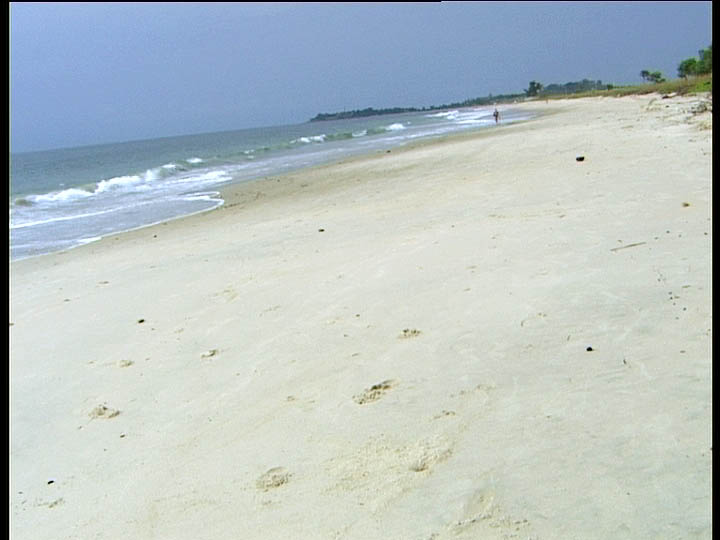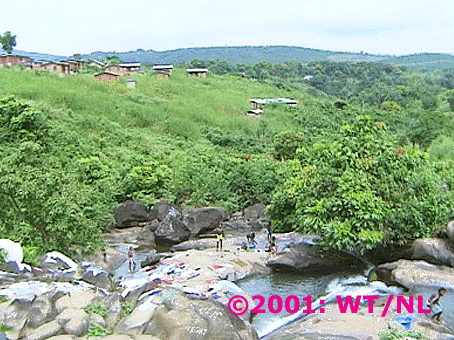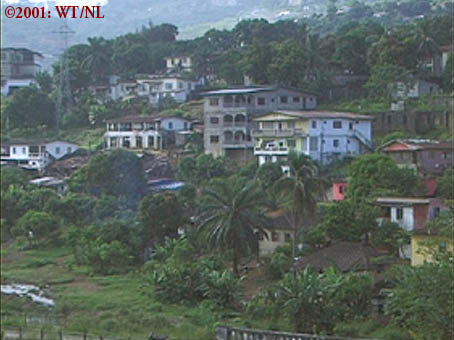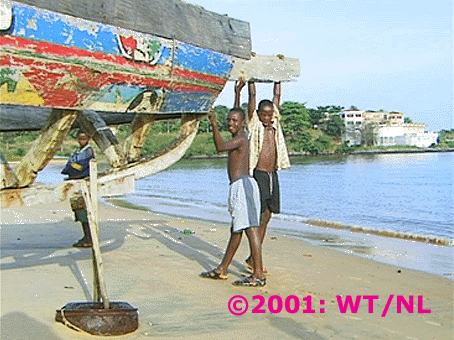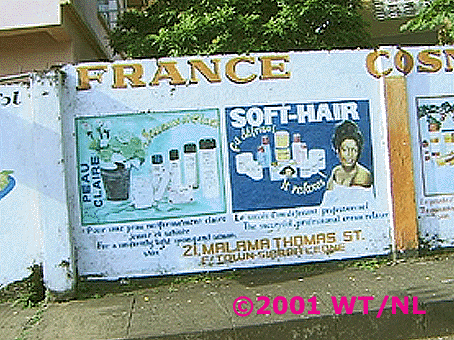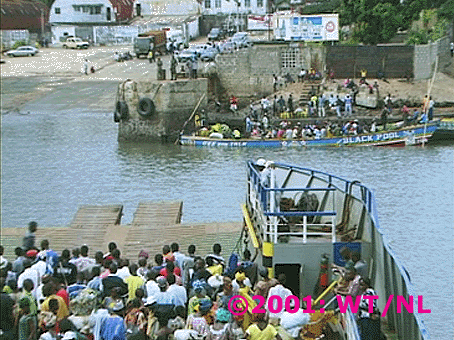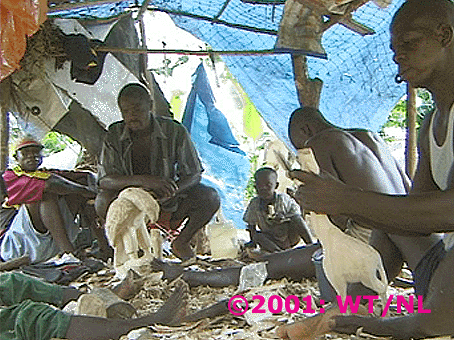|
Sierra Leone has substantial mineral, agricultural and fishery resources. Agriculture employs about two-thirds of the
working population, with subsistence agriculture dominating the sector. The mining of diamonds, bauxite and rutile
provides the major source of hard currency. Manufacturing consists mainly of the processing of raw materials and of light
manufacturing for the domestic market. The ten-year civil war, which ended in late 1999, dealt a severe blow to the
economy, displacing nearly 1.5 million (out of a total population of 4.7 million), and resulting in large-scale destruction
of social and physical infrastructure. Mining and agricultural activities were particularly hard hit, as reflected in a
decline in recorded merchandise exports from US$150 million in 1992 to only US$42 million in 1995. Sierra Leone’s economic
development has been stop-go since the country fell under the grip of civil war. Since the last quarter of 1999, the
economy has been recovering rapidly, both through strong international support and through the rehabilitation efforts of
the Government. Despite security setbacks, economic reforms have continued. There are many large international companies
based in Africa, which are having good success, where Africans have great careers allowing them to progress in life and
take care of their family; their children are able to go to school and play soccer or follow computer courses.
A good example is SLSA in Freetown. Sierra Leone has long had women chiefs and highly-educated women, and the oldest
girls' school in Africa is Annie Walsh Memorial School for Girls. There are good things about international business,
but in industries such as mining, one cannot say that most of them have acted responsibley or for the good of Sierra
Leoneans so far! Second, anyone who didn't know better would think that Sierra Leoneans do not have a rich history of
agriculture, fishing, textile-making, gold-working, and professional training and practice (at independence, Sierra Leone
had one of the highest proportion of highly-educated people in Africa and of general literacy).
European interest in the territory presently occupied by the Republic of Sierra Leone dates back to 1495, when the Portuguese built a fort on the site of what is now Freetown, Sierra Leone’s capital city, to serve as a trading post for gold, spices, ivory and slaves. Originally, it was explored by the Portuguese in the 1400's, but French, British, Dutch and Danish limited Portuguese control in the region. The government for all Great Britain's West African possessions made Freetown it's seat in 1821. Freetown retained this position till 1874. It became the nation's capital in 1961. The British began to take a closer interest in Sierra Leone in the seventeenth century and paid tribal chiefs for the privilege of warehousing merchandise there, and later, the Royal African Company established two trading posts. In 1772, following the abolition of slavery in England, 40,000 slaves were returned to Freetown (hence its name). Britain later declared the area a crown colony and developed trade with the inhabitants of the interior of the country. War would later break out between the colonialists and the interior tribes led by Bai Bureh, following whose defeat and exile Sierra Leone effectively became part of Britain’s West African empire.
Sierra Leone became a republic in 1971, with Siaka Stevens as President for a five-year term. In 1978 it became a one-party state under Steven’s APC party. Sierra Leone’s recent history has been dominated by military takeovers and civil war (from roughly 1990-95). In February and March 1996, after nearly 30 years, democratic multi-party parliamentary and presidential elections were held and Sheikh Ahmad Tejan Kabbah became President. In May 1997, he was overthrown in a coup led by junior ranking officers but was restored in March 1998, following a military offensive by ECOWAS Military Observer Group (ECOMOG), the military wing of the Economic Community of West African States (ECOWAS).
The civil war continued in the Sierra Leonean countryside, following President Kabbah’s restoration in March 1998 by ECOMOG troops. In January 1999, the rebel Revolutionary United Front attacked and held Freetown but were later repelled by ECOMOG and Government forces. From their strongholds in the diamond-rich northern parts of the country, the rebels continued to hold out. The Government strategy henceforth rested on a dual-track approach, combining a military offensive with efforts to secure a negotiated settlement (with donor endorsement at the April 1999 London meeting of the Friends of Sierra Leone). Efforts to broker a peace settlement (in which ECOWAS countries, especially Nigeria and Togo, the UN and Liberia’s President Charles Taylor played significant roles) led first to a cease-fire, then to the signing of a Peace Agreement in Lome on July 7, 1999. Under the Accord, a Government of inclusion was formed, with rebel nominees being appointed to ministerial and deputy ministerial positions. A general amnesty for the rebels and their allies was also provided for. The Lome Peace Accord was violated in May 2000, when the ceasefire was broken and the rebels held hostage some 500 UN peacekeepers. Since then, with support largely from the UK and an extended UN peacekeeping force, security has been generally restored to Freetown and its environs, and the key rebel leaders are under Government custody.
BRUSSELS/BELGIUM: 30 April 2009:
BRUSSELS AIRLINES flies Africa

In 2002 SN Brussels Airlines was created to continue in the steps of the two companies Sabena and DAT, who between them had an unequalled safety record. BRUSSELS AIRLINES was created following the merger of SN Brussels Airlines (SNBA) and Virgin Express. On 12 April 2005, SN Airholding, the company behind SNBA, signed an agreement with Richard Branson, giving it control over Virgin Express. On 7 November 2006, the new name, Brussels Airlines, was announced at a press conference at Brussels Airport. Brussels Airlines began operations on 25 March 2007. On September 15, 2008 it was announced that Lufthansa will acquire a 45% stake in Brussels Airlines with an option to acquire the remaining 55% from 2011. As a part of this deal Brussels Airlines will join Star Alliance. On March 13, Brussels Airlines announced that the airline will codeshare all their flights to Germany with Lufthansa. The codeshare agreement will start from March 29. This new step is part of the integration of Brussels Airlines into the Star Alliance network. Brussels Airlines becomes a Star Alliance member in 2009. From 26 April 2002 SN Brussels Airlines opened frequent Africa connections and presently BRUSSELS AIRLINES serves safe and reliable flights to:
ANGOLA (Luanda) - BURUNDI (Bujumbura) - CAMEROON (Douala & Yaoundé) - CôTE D'IVOIR (Abidjan) - DEMOCRATIC REPUBLIC OF THE CONGO
(Kinshasa) - THE GAMBIA (Banjul (Banjul) - GUINEA (Conakry) - KENYA (Nairobi) - LIBERIA (Monrovia) - RWANDA (Kigali) -
SENEGAL (Dakar) - SIERRA LEONE (Freetown) - UGANDA (Entebbe)
Mr. Mansour specially created a web page as he states, "to reply to the outrageous and false allegations made by some
foolish, barbaric, and useless africans against us, the Lebanese". Us-Africa likes to express that the publication in
the Standard Times as well as the response from Mr. Mansour are solely their opinions and do not have to reflect the opinion
of our editorial staff.
This is what Mr. Mansour wrote and published on his Internet Site KENEMA: "After reading the allegations on some website, I decided to create the Responses page
to reply to those who are stupid and disrespectful enough to say such things about us, the Lebanese. What
I previously wrote on this Responses page wasn't harsh, impolite or just bunch of lies (as some may say) but
offended some civilized and educated Sierra Leoneans. So, I decided to reply to the allegations in a nicer and
less offensive way.
Some foolish and uncivilized webmaster stated that we, the Lebanese, are rapists and smugglers,
others call us dumb people who have nothing to do but sit in their shops whole day. They have forgotten
what we have done for Sierra Leone. They have forgotten what we have sacrificed and what we have spent
to help build Sierra Leone to what it was before the civil war. They have forgotten that those dumb people
sitting in their shops whole day are the ones that have been supplying them with everything they needed
since the 1950s. They have forgotten that the economy depends on us, and whenever we close our stores for some reason,
Sierra Leone becomes so paralysed and its people become so lost you'll have pity on them.
Don't misunderstand me. Some Sierra Leoneans are educated and civilized enough to understand what I'm saying,
and those aren't the ones I'm replying to. I'm replying to those who have planted in their stupid minds since
childhood that we, the Lebanese, are evil and want nothing but to destroy Sierra Leone's riches. And that one
day, they'll succeed in driving us out of OUR Sierra Leone. Keep on dreaming I say, keep on dreaming!
You blame your government for your vices, and call it corrupt??!! In Sierra Leone, there is no such thing as
corrupt government or officials, but corrupt people; people who have nothing but hatred for each other.
YOU ARE UNGRATEFUL TO ANYONE WHO WANTS YOUR OWN GOOD, from your own Government to the Europeans to the
Lebanese who have been living with you for almost a century".
The whole story is available at: KENEMA
Freetown, 10 October 2001: "Quote Standard Times"
|

